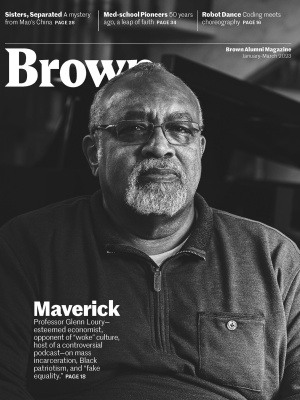Tackling Climate Change
The new director of the Institute at Brown for Environment and Society shares her insights on climate science and solutions.
President Christina H. Paxson invites Kim Cobb, new director of the Institute at Brown for Environment and Society, to share her insights on climate science and solutions.
After one of my recent guest lectures, a student raised his hand and asked, “In your expert opinion, is it even possible to fix climate change? In my generation, we feel hopeless in the face of the collapse of civilization.”
As a climate scientist, I can’t blame anyone for feeling overwhelmed about the magnitude of the climate crisis. At current rates of greenhouse gas emissions, we will blow past the 1.5 centigrade warming level—the most ambitious goal set in the Paris Agreement—in the next 10 to 15 years.
But there is so much we can do, and must do, to address the climate crisis. I joined Brown as the new director of the Institute at Brown for Environment and Society because Brown has all the key ingredients to rise to a position of local, regional, national, and international leadership on climate solutions. Already a global powerhouse in interdisciplinary environmental research and education, IBES can unlock that potential at Brown by tapping into additional research capacity across campus. Climate change presents a set of interconnected, systems-level challenges, requiring the development and deployment of integrated solutions drawn from a wide variety of disciplines and perspectives.
One area of climate solutions research that draws on Brown’s strength is adaptation and resilience, which seeks to help communities protect themselves from worsening climate impacts. Effective solutions in this space must include a focus on underserved communities, which will continue to pay the highest costs of climate change. In pursuing such solutions-
inspired research, IBES can draw on domain expertise housed in the School of Public Health, the Native American and Indigenous Studies program, and the Center for the Study of Race and Ethnicity in America, as well as disciplinary expertise from the physical, natural and social sciences, the humanities, and the arts. I’m particularly excited to partner with the new Brown Arts Institute to explore innovative ways of engaging our students, the general public, and policymakers in shaping visions of our climate future.
Emissions reductions are critical to slowing and eventually reversing climate change in the next decades. With its focus on low-carbon energy technology, Brown’s new Sustainable Energy Initiative will be a key partner in developing emissions reductions strategies that maximize co-benefits such as improved public health, economic growth and opportunity, and preservation of biodiversity.
Climate solutions work must extend far beyond the walls of our campus, as diverse partnerships are essential for developing successful solutions at every scale. Such partnerships serve two purposes. For one, they identify the specific challenges where focused research can close key knowledge gaps and/or generate transformative innovation. Second, they facilitate the translation of climate solutions research into real-world impact. Key partners include communities on the frontlines of climate change—connections that can leverage the Swearer Institute at Brown as a robust platform for community-engaged research and education. Additional partners include policymakers at local, state, and federal levels. Here, a history of sustained collaboration between IBES and Brown’s Climate Solutions Lab has strengthened ties to policymakers. And last but not least, strategic partnerships with the private sector will unlock additional potential in the form of entrepreneurial opportunities for our faculty and students, as well as the continued development of science-based climate action in the private sector.
We have the immense privilege of training the next generation of climate leaders, who can work shoulder to shoulder with researchers and stakeholders during their time at Brown. If we can live up to that promise, we will equip and empower our students to play key roles in shaping a safer, more equitable, and stable climate future.
Read the January–March President’s Spread on “Transforming Brown's Research Enterprise” here (PDF).





